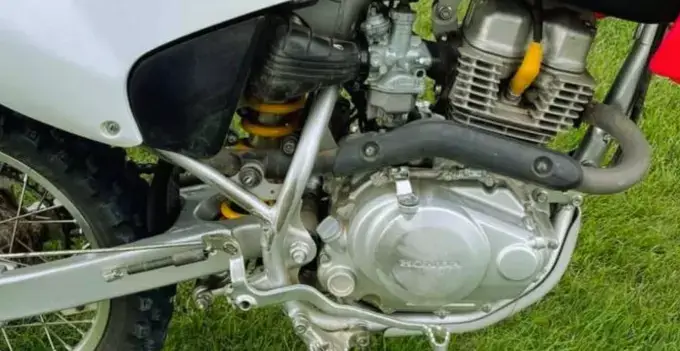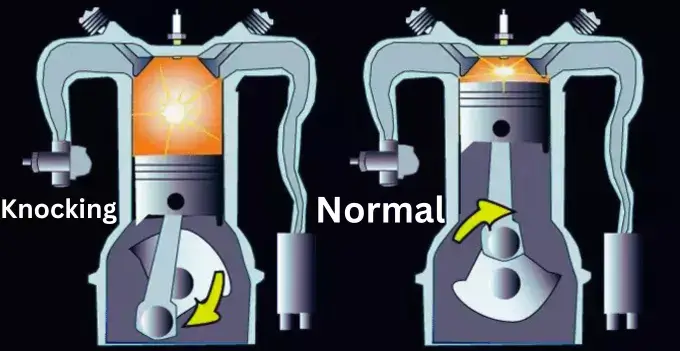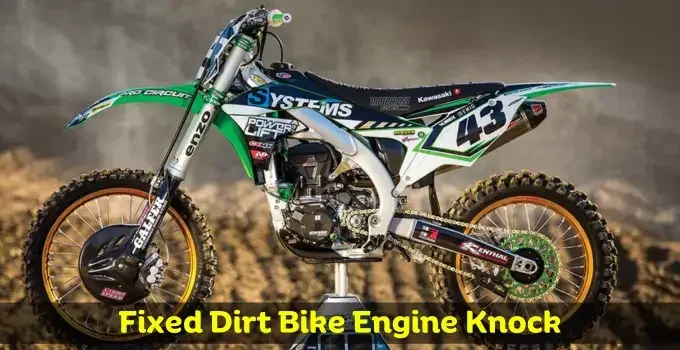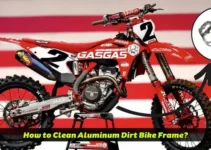Do you hear a knocking sound coming from your dirt bike engine?
If so, you are not alone. Engine knocking in a dirt bike is a serious problem that can lead to catastrophic engine failure.
Knocking produced in the engine should not be ignored. Improper detonation causes the knocking in the engine. This post discusses the main causes of knocking in dirt bike engines and how we can resolve them.
The engine knocking on a dirt bike is a serious problem. If you hear the knocking from your dirt bike engine while you’re riding, you should stop riding and conduct an immediate inspection by a highly qualified mechanic. Continuing to ride with the knocking leads to engine failure.
Causes Of Dirt Bike Engine Knocking

Do you know about premature detonation? It is the main cause of knocking in dirt bike engines. The piston can get to the top before the air and gas ignite then premature detonation occurs. More heat and pressure can be produced by detonation, which leads to engine knocking.
Do you know?
A new dirt bike engine cylinder has be invented which can pick up to 1000 mile/sec speed in just 30 seconds
Common Reasons For Knocking
1. Substandard Fuel Quality
Low or dull-quality fuel may cause the engine to knock. Low quality fuel like E10(10% ethanol and 90% gasoline), E15(10.5% to 15% ethanol mixed with gasoline), B5(5% ethanol and 95% gasoline) and B2(2% ethanol and 98% gasoline).These types of low-quality fuels may cause knocking in the engine.
2. Ignition Time
High ignition timing may cause knocking in the engine. High ignition time disturbs the air-fuel mixture; in this way, knocking is produced within the engine. Improper ignition timing leads to knocking in the engine.
3. Oil level low
One of the major causes of knocking in engines is low engine oil levels. A low engine oil level increases the friction between engine moving parts, which may cause knocking. Low oil levels can cause starting problems, and an engine ceases, and further damage to engine elements or parts.

4. Overheating
Excessive heat or temperature in the combustion chamber creates hot spots, which cause the ignition timing and detonation; these factors may cause the knocking in the engine. Overheating results from issues like a damaged cooling system, insufficient cooling level or a damaged thermostat.
5. Incorrect Fuel To Air Ratio
An incorrect fuel-to-air ratio leads the engine to knock. There are 2 main parts: lean and rich fuel mixture. A lean fuel mixture occurs when there is enough air and not enough fuel. A rich fuel mixture contains more fuel to produce more oxygen in the cylinder.
Valve Train Issues
Valve train issues give rise to various problems and impacts on engine working.
1. Damage Valves
Damage or bent valves have an impact on the overall performance of the engine. The damaged valve may not seat properly, leading to low compression in the engine. A damaged valve doesn’t fit into the seat properly against the valve and increases the emission. A damaged valve can also damage the other components.

2. Broken Valve Spring
A broken valve spring is a special factor in the valve train system. A broken valve spring can cause irregular movement, leading to increased engine noise and having a total impact on the performance of the dirt bike engine. The broken spring doesn’t provide the necessary force to close the valve properly.
3. Valve Clearance
If your dirt bike engine is making a loud noise of ticking or tapping or you notice a decrease in the engine power, that is the proper sign to adjust the valve difference. When your bike is cold and hard to start, adjust the valve seating core to the difference between the upper and lower valves.
4. Valve Seat Wear
In general, at high loads on the engine or high temperatures, valve seat wear takes place. Valve seat wear occurs due to high combustion pressure. Improper adjustment can cause the difference between the valve and the valve seat, which may lead to wear.
Piston Slap
Excessive clearance between the piston and cylinder walls produces the piston slap.
1. Causes Of Piston Slap
When the cylinder wall is damaged or scratched, it increases the difference or the clearance between the piston and cylinder walls, which may produce a piston slap. Cold reservoirs also produce the piston slap. It can only be cured by engine rebuild or cylinder rebored.
2. Factors Affecting On Piston Slap
Damaged rings or pistons can create an irregular surface, increasing the clearance or piston slap. Higher engine speed or more load on the engine can affect the piston slap. The condition of the cylinder walls also impacts the piston slap. Overheating doesn’t affect the piston slap.
3. Results Of Piston Slap
The major result of piston slap is piston-to-wall clearance can cause knocking in the dirt bike engine. Oil burning, misfiring or power loss in the engine result from piston slap. If you forget the piston, the piston slap problem is generated.
Rod knock
A rod knock is a serious issue in a dirt bike engine. A rod knock is produced by a connecting rod, which is a metal rod that connects the piston to the crankshaft. If the rod is allowed to continue to move around, it can eventually break, which will cause the engine to seize up. It can be a very dangerous situation.

1. Improper Maintenance
The risk of rod knock is increased by not following the manufacturer’s recommended maintenance schedule. It includes the components like changing the oil and air filter regularly, checking the coolant levels, and inspecting the engine for signs of wear and tear.
2. Overloading
Overloading the engine can cause the pistons to hit the cylinders, creating a knocking sound. It can damage the engine and lead to failure. Overloading the engine can cause the spark plugs to misfire. It can decrease the engine’s power and efficiency.
3. Dirt Or Debris
It can enter through the air intake or the fuel system and cause damage to pistons, cylinders, or other components. The exhaust system is responsible for the dirt or debris. If the exhaust system is not properly sealed, dirt enters the engine and leads to the rod knock of the dirt bike engine.
How to fix knocking
- Use high octane level fuel
- Must have a proper oil level in the engine
- Must be sealed properly and have a clean air filter
- Must replace engine parts when they get damaged
- Proper ignition timing
- Seek professional help if needed: If you’re enabled to identify or resolve the knocking, then you should contact a professional mechanic.
- Avoid from overloading
- Avoid riding the bike too hard or for too long
- Keep the air intake and fuel system clean
- Use a fuel stabilizer

Conclusion
Managing the engine knocking in a dirt bike is more important for maintaining the best performance and avoiding further damage. There are many reasons for engine knocking, such as low-quality fuel, ignition timing, low oil level, damaged valves, and piston slap.
If you identify the basic problem of knocking, you should take appropriate steps, such as using the best quality fuel, checking ignition timing, checking the oil level, and addressing the cooling system; after this, you can easily fix the knocking in the engine.
FAQs
What is a rod knock on a dirt bike?
A rod knock is a serious problem that can occur in a dirt bike engine. It is caused by the connecting rod, a metal rod connecting the piston to the crankshaft, becoming worn or damaged.
What is a piston slap in a dirt bike engine?
Excessive clearance between the piston and cylinder wall can cause the piston slap in the dirt bike engine. More than 0.002 inches difference between piston and cylinder walls can be cured.
Why is my dirt bike making a knocking noise?
A dirt bike making a knocking noise when there is no proper fuel/air mixture, ignition timing, overheating and substandard fuel quality may lead the dirt bike to engine knocking.
What is a lean knock?
A lean knock means a lean air-to-fuel mixture with too much air and a lean amount of fuel. It would help if you properly cured the air-fuel mixture.
Why is my dirt bike knocking when I accelerate?
The improper combustion process is one of the main reasons for dirt bike engine knocking. Improper air/fuel mixture and improper ignition timing may cause the dirt bike engine knocking.
How To Prevent A Catastrophic Engine Failure?
Manufacturing defects are rare catastrophic engine failures, but they can happen. A qualified mechanic should cure the engine, keep the engine clean and follow the manufacturer’s recommended maintenance schedule.






![Do You Need A License To Drive A Dirt Bike? [Expert Guide] Do You Need A License To Drive A Dirt Bike? [Expert Guide]](https://dirtbikecoach.com/wp-content/uploads/2022/08/What-Is-An-Enduro-Mountain-Bike-211x150.png)
![Best Tips To Prevent Dirt Bike Arm Pumps [Must Read] Best Tips To Prevent Dirt Bike Arm Pumps [Must Read]](https://dirtbikecoach.com/wp-content/uploads/2022/07/Best-Dirt-Bike-Movies-7-1-211x150.png)